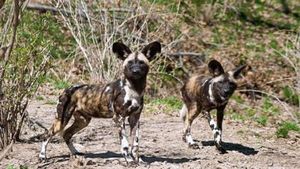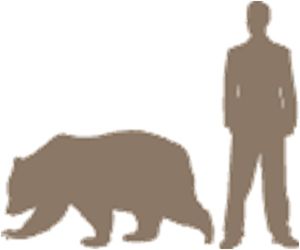Sometimes I wonder about people.
This
thought comes from a few news stories I found today. One you might
have heard of, and one you probably wish you had.
The first involves the mother whose son
was mauled to death by African Dogs, or Painted Dogs, in a zoo.
Is it sad? Yes, no human being should go through what she did with
her son, simply put it hurts all those involved.

how much money? No. Zoos have signs up all over the place – any
time you come to a fence where you can look into and over an exhibit.
After volunteering at a zoo, I can tell you exactly what it says,
“Please do not sit on or lean over the fence/barrier.” In other
words, realize that this is an animal that could possibly harm you if
you got too close.
Obviously this woman did what many
other parents do, and ignored the warning.
Is it the zoos fault? No, they not only
warn you of the danger they have engineers who design these
enclosures to be as safe for humans as possible.
Is it the mothers fault? She is more at
fault than the zoo in my opinion. She decided what to do that day, no
one pressured or made her do it.
Is it an unfortunate accident that can
happen even in the best of circumstances? Yes, because accidents do
happen to the most prepared of us.
The other story is more or less
reminiscent of the story about a family keeping their deer that I
talked about a while ago.
This time, however, the wildlife in question was a bear.
Do you remember what I said back then?
Something similar will happen and that family should be prepared to
shoulder the blame.

rescued a bear cub about six months ago. When he came back to his house after work on Monday he discovered
that Wildlife Officials had taken the bear.
Throughout the story he talks about how
the bear is his baby and that she needs him.
WRONG!
The bear is a bear and more than
likely in a few weeks, maybe days, she will forget you. Also, does he
realize that while the bear may only be about 10-15 pounds now, will
one day grow up to be a couple hundred. With teeth and claws made for
killing things like him?
Obviously this man has not thought this
through. What angers me the most is that all of the comments
following the story all say how sad it is for him. How the government
should give him back the bear. Even trying to bring in a connection
to another story, similar to that family in Michigan.
Let me make this clear right now, there
is nothing similar nor will there ever be. The only similarities are
stupid people who think that they are better substitutes for
wildlife's real mothers.
It was reading these two stories that I
finally came to an epiphany about wildlife in America.
This is the problem, this thought that
we have as humans that we are better than anything out there. That
anything can happen. That we can survive a 12-foot fall into an
enclosure with wildlife that eat only meat and survive. That
carnivores will never hurt or eat us because we raised then with
tender loving care. Even though they will outweigh you by at least
100 pounds.
The only reason we consider ourselves
better than them is the fact that where they might kill one of us, we
can kill ten of them in the same amount of time.
This has lead to misconceptions and
false beliefs that we can change their behavior simply by being
ourselves. This concept is shown to us everyday on the TV. Someone
adopts a wild animal as a young baby, and we the viewer are shown the
animal's progress over the course of a half hour or hour, depending
on the show. This leads us to believe that if they can do it, anyone
can do it.
What we are not shown is all of the
time and effort that the person had to go through. All of the time
they spent inside going over notes and facts for class. How many
hours they have to spend a day working with that animal, if they ever
get that chance.
We as Americans have been made to think
that raising wildlife is simple through movies, television shows,
stories, and books. It has gotten to the point that I have a friend
who wants to own a wolf. She has done research on where she can live
and the regulations on owning such an animal. She is better than most
who just find the animal one day.
Yet, the problem still remains. So at
the end of the day who do we blame for all of this? The Zoo or
Government for trying to protect us? The parent or adult for being
oblivious? Or the child who did not know any better?
NOTE: Robin, a 2013 graduate of Texas A&M in Kingsville in wildlife management, is presently seeking her first job in urban wildlife policy.











